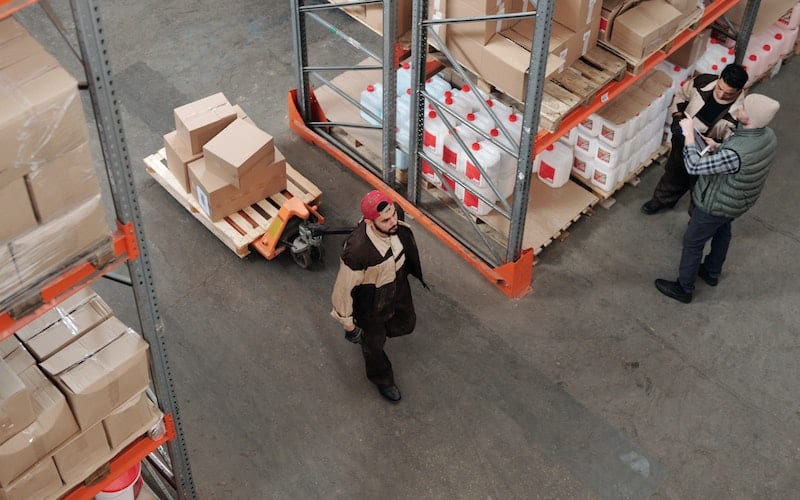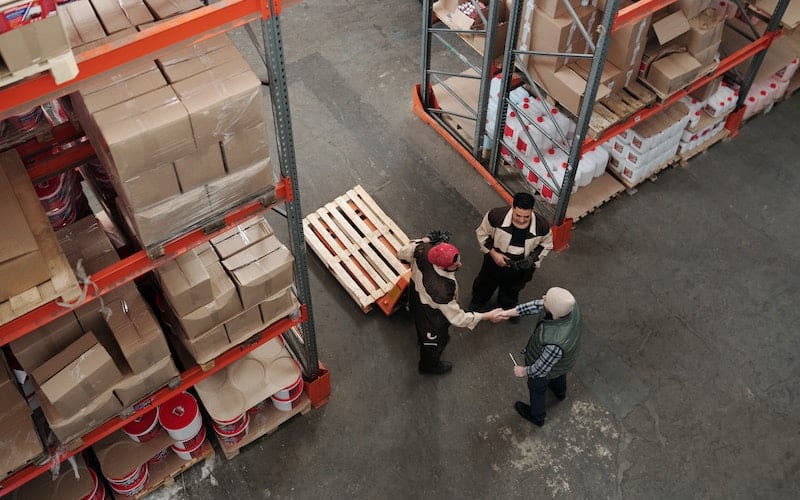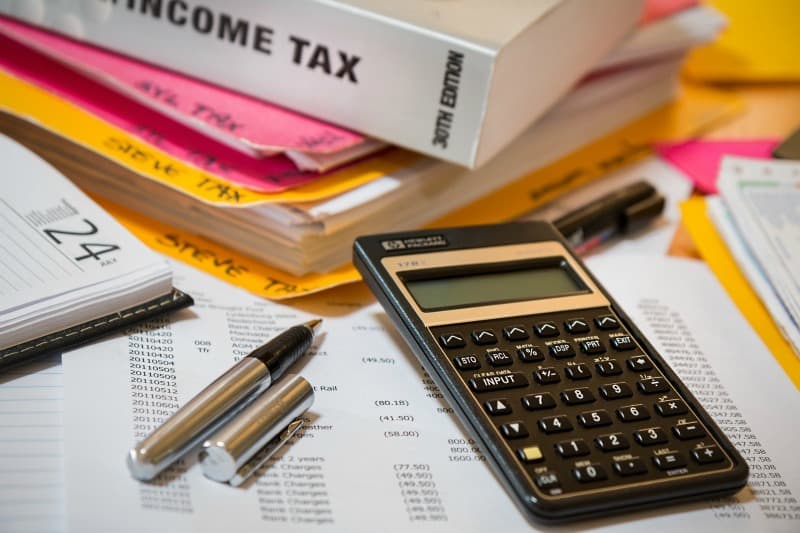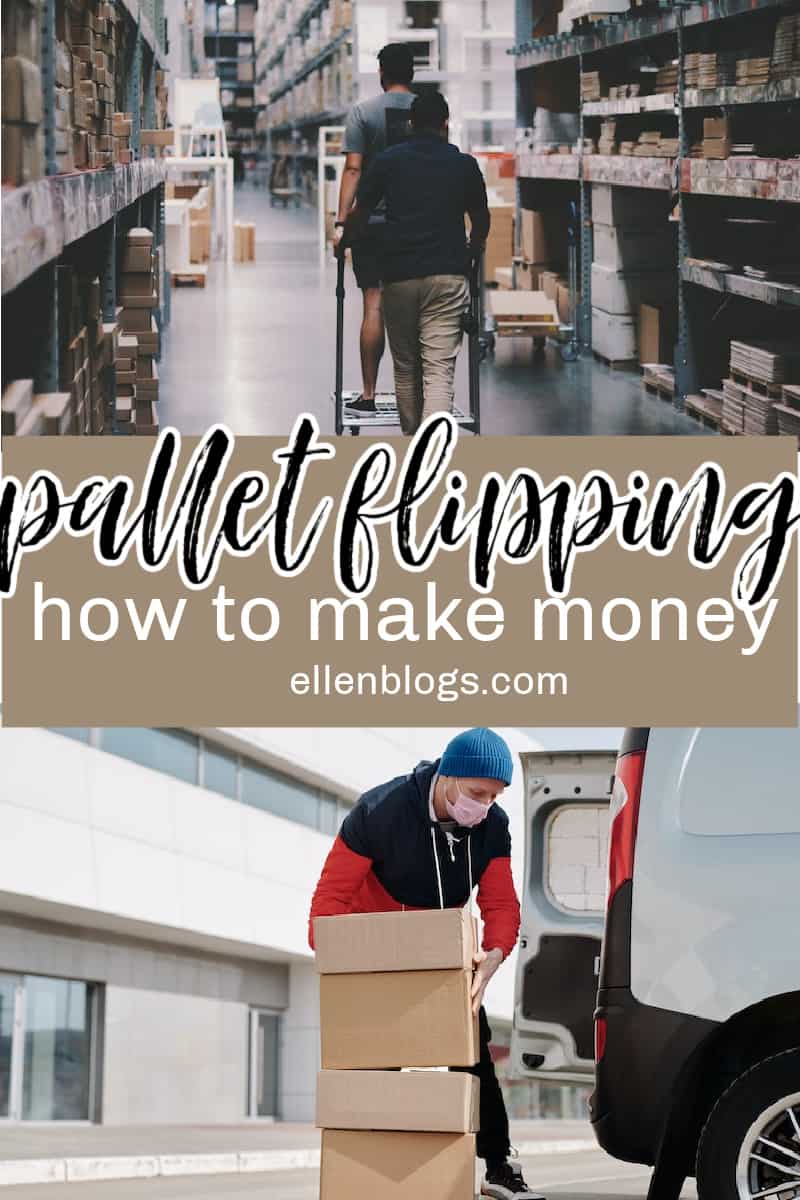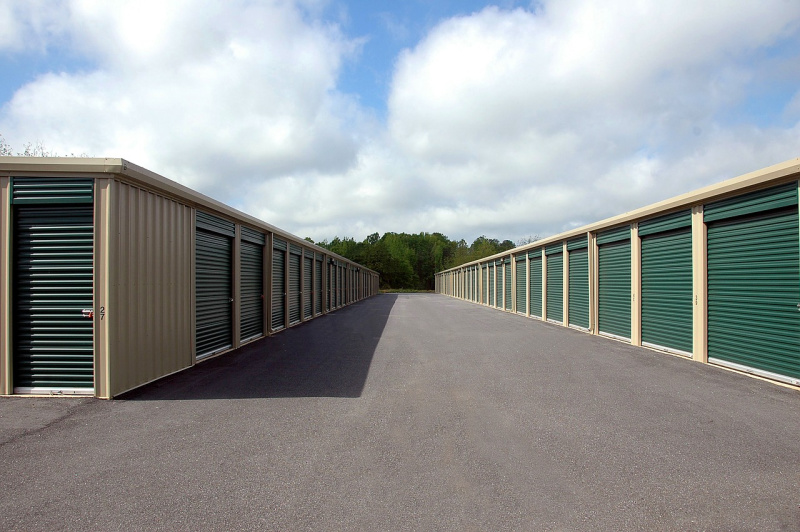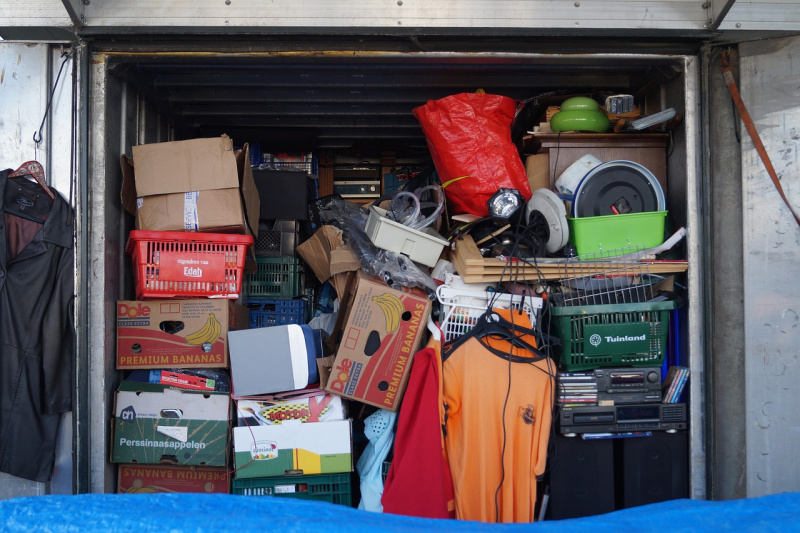Last Updated on September 15, 2023 by Ellen
Can you make money flipping pallets? Find out what you need to know to get into the pallet flipping business.
Posts may be sponsored. This post contains affiliate links, which means I will make a commission at no extra cost to you should you click through and make a purchase. As an Amazon Associate I earn from qualifying purchases.
Can You Make Money Flipping Pallets?
Buying liquidation pallets and reselling them for a profit is a potentially lucrative venture. In simple terms, this involves purchasing goods in bulk, often from stores closing down or clearing stock, at a significantly reduced cost.
These goods arrive on wooden pallets, hence the term ‘pallet flipping’. The real money-making magic happens when you resell these items individually, often at a price much lower than retail, yet still higher than your initial bulk purchase cost. This difference becomes your profit. It’s a straightforward process, but like any business, it does require some research and a keen eye for deals to be successful.
This product presentation was made with AAWP plugin.
Can you make money pallet flipping?
Absolutely, you can make money flipping pallets. It’s a business venture where you buy products in large quantities on wooden pallets, typically at a discounted price from liquidation sales or store clearances. The goal is to resell those individual items at a cost higher than your initial purchase but lower than their retail values.
However, it’s important to note that success in liquidation pallet flipping isn’t guaranteed. It requires careful planning, a good understanding of market trends, and a knack for finding the best deals. Additionally, you should be prepared to handle logistics like transportation and storage. A well-researched strategy can help you manage these challenges and increase profitability.
In conclusion, while pallet flipping can certainly be a profitable venture, it’s not without its challenges. As with any business, it requires dedication, keen market insight, and a little bit of luck. But with the right approach, it could turn out to be a rewarding and profitable business endeavor.
Where do you find liquidation pallets?
Finding liquidation pallets can be accomplished in several ways, depending on your location and the resources available to you. One of the most common places to source these pallets is from physical liquidation warehouses. These are large facilities that purchase unsold stock directly from retailers and sell it on to other businesses, often packed on pallets. Visiting these warehouses in person can provide an opportunity to inspect the goods before purchasing, ensuring they’re of good quality.
Another place to look for liquidation pallets is online. There are various websites and online auctions where businesses sell their unsold or returned items in bulk. Some well-known websites include Bstock.com, Liquidation.com, and Directliquidation.com. These sites typically provide detailed descriptions of the items included in each pallet, as well as photos. But remember, buying online means you can’t physically inspect the goods before purchase.
Finally, you can also get in touch with local retailers directly. Small, independent stores may be willing to sell unsold stock at a discounted rate to clear space for new products. This approach requires a bit more legwork and networking, but it can lead to valuable business relationships and ongoing supply deals. Remember to always be professional and respectful when approaching businesses with these proposals.
Is pallet flipping profitable?
Pallet flipping can indeed be profitable if approached properly. The business revolves around buying goods at a reduced price and selling them individually at a profit. The key to gaining profit lies in the ability to obtain goods at a significantly low cost, and then finding buyers willing to purchase them at a higher price. This difference in buying and selling prices is where the profit comes from. It’s essential to understand market trends, know what goods are in demand, and find the best deals to maximize profitability.
However, like any business, liquidation pallet flipping comes with its own set of challenges. The biggest among these are logistics and storage. Purchasing goods in bulk means you will need a place to store them. Furthermore, transportation of these goods from the place of purchase to your storage facility and then to the buyer can also add to the costs. These costs need to be considered when calculating potential profit.
In conclusion, while pallet flipping can generate a good income, it is not a guaranteed success. It requires effort, research, and a certain level of business acumen. But with careful planning and strategic execution, it holds the potential to be a profitable venture. Remember, every business venture carries a degree of risk and pallet flipping is no exception. Nonetheless, with patience, determination, and a keen eye for good deals, it is entirely possible to make a considerable profit from this business.
How profitable is flipping pallets?
The profitability of flipping pallets largely depends on the type of goods you choose to flip. Some items, such as electronics, furniture, or branded clothing, might fetch a higher resale price due to their intrinsic value and demand.
On the other hand, items like generic clothing or household decor might not yield as much profit. Therefore, the key to maximizing earnings in pallet flipping lies in selecting the right items to flip.
Conducting market research, understanding consumer trends, and being aware of the retail value of goods are all essential steps in this process. Hence, in simple terms, the more desirable and valuable the goods you flip, the more profitable your business could be.
Is pallet flipping tax free?
No, pallet flipping is not tax-free. Like any business activity, income generated from flipping pallets is subject to taxation. It’s crucial to keep accurate records of your transactions and earnings, as these will be needed to calculate and pay your taxes.
Always consult with a tax professional to understand your responsibilities and ensure you are in compliance with all relevant tax laws.
Is there shipping on pallets?
Yes, shipping is often involved when dealing with pallets. You’ll usually need to arrange transportation for your pallets from the liquidation warehouse to your storage location, and then onto the final destination or buyer.
Shipping costs can vary based on the size and weight of the pallet, and the distance it needs to travel. Always factor these costs into your budget when considering a pallet flipping business.
Startup costs for flipping pallets
Starting a pallet flipping business does involve some initial startup costs. Here are five potential expenses you may encounter if you want to make money flipping pallets:
- Purchase of Initial Pallet(s): This is the primary startup cost. The price can vary widely depending on the type of merchandise and the source of the pallets, but expect to pay anywhere from a few hundred to a few thousand dollars per pallet.
- Storage Facility: Depending on the number of pallets you intend to flip, you may need to rent a storage facility. Costs will depend on the size and location of the storage unit.
- Transportation: You’ll need a means of transporting the pallets from the source to your storage facility and then to the buyers. Shipping costs could involve renting a truck or hiring a freight service.
- Packing Materials: To resell items individually, you may need packing materials like boxes, bubble wrap, and packing tape.
- Business Expenses: If you’re planning to operate as a business, there may be additional costs like registering your business, purchasing insurance, and accounting or tax preparation services.
How quickly do you resell items?
The speed at which you can resell items from pallet flipping largely depends on various factors such as the type of goods, their condition, and market demand. For highly sought-after items like electronics or branded clothing, they may sell quickly due to higher market demand. As a rule of thumb, quality items in good condition typically sell faster.
However, for generic items or those in less-than-perfect condition, it may take longer to find a buyer. In these situations, patience and marketing skills come into play. Effective advertising, competitive pricing, and knowing your target market can significantly help in selling these items faster.
It’s essential to remember that pallet flipping isn’t a get-rich-quick scheme. It involves understanding market trends, choosing the right products, and effectively marketing those products to the right audience. While there may be times when items sell quickly, there may also be times when sales are slow. Having a strategic plan can help navigate these fluctuations and maintain a steady sales pace.
What are the best things to flip for profit?
- Seasonal Items: Products associated with particular seasons or holidays, such as Christmas decorations, Halloween costumes, or pool inflatables, can yield significant profits if bought off-season and sold closer to the relevant holiday or season.
- Small Kitchen Appliances: Items such as blenders, coffee makers, or air fryers are constantly in demand. When purchased at a reduced cost and in good condition, these can be resold for a considerable profit.
- Sports Gear: Equipment for popular sports like baseball gloves, golf clubs, or yoga mats can be profitable, especially if they are from well-known brands and in good condition.
- Collectibles: Stamps, coins, or vintage toys can fetch a good price from collectors. The value of these items often increases over time, making them a potential goldmine for pallet flippers.
- Toys Like Legos: Lego sets, particularly themed or limited-edition ones, can be highly sought after. They retain their value well, and some older sets can be sold for far more than their original price.
- Gaming Equipment: Consoles, video games, and accessories like controllers or VR headsets are in constant demand due to the booming gaming industry. They can command a high resale price, especially limited-edition or retro gaming items.
- Designer Clothing: Branded clothing, especially from high-end designers, can be quite profitable. Items like jackets, shoes, or handbags often fetch a high resale price.
- Electronics: Items like smartphones, tablets, or laptops from well-known brands are always in demand and can be resold for a significant profit.
- Furniture: Good quality, well-made furniture, especially if it’s a vintage or designer piece, can be highly profitable when resold.
- Garden Equipment: Items like lawnmowers, leaf blowers, or patio furniture can be sold for a good profit, especially during the spring and summer when people are focusing on their outdoor spaces.
Tips for choosing liquidation pallets as a side hustle
If you want to make money flipping pallets, here are some tips.
- Do Your Research: Understand the types of products that sell well in your market. Check for demand and competitive prices before purchasing a liquidation pallet.
- Start Small: Begin with a small investment. As you gain experience and understand the market, you can gradually increase your investments.
- Inspect Before Buying: If possible, inspect the pallet before purchasing. This can help avoid surprises regarding the condition and quality of the merchandise.
- Think About Storage: Ensure you have enough space to store the goods. A cluttered workspace can lead to damaged products and lost profits.
- Plan for Shipping Costs: Remember to factor in the cost of shipping when calculating your potential profits. Overlooking this can significantly impact your earnings from liquidation pallets.
This product presentation was made with AAWP plugin.
Should you buy mystery pallets?
Buying mystery pallets can be akin to taking a gamble. On one hand, the allure of discovering valuable items hidden within the mix can be enticing. Since these pallets are usually sold at a significantly lower cost compared to the retail price of the goods, there’s potential for a high profit margin if you stumble upon in-demand items. Furthermore, the element of surprise that comes with unpacking a mystery pallet can add an adventurous aspect to the otherwise business-oriented process of pallet flipping.
On the other hand, the risk of ending up with undesired or low-value inventory is also real. Not having a clear view of the exact items you’re purchasing can lead to a stockpile of hard-to-sell goods, potentially tying up your investment and storage space.
It’s also challenging to accurately calculate potential profits or plan your resale strategy without knowing what you’re working with. In conclusion, while buying mystery pallets might seem exciting, it’s crucial to be aware of the potential risks and to weigh them against the possible rewards.
Can you make money selling pallets?
Yes, selling liquidation pallets can indeed be a profitable venture, but like any business, it comes with challenges and requires strategic planning and marketing. Your profit will depend on several factors including the cost of the pallet, the type of items you’re selling, their condition, and market demand. Therefore, careful selection of pallets, thorough inspection of items, and a clear understanding of market trends are critical to making money from this venture.
The key to selling pallets efficiently lies in identifying your target audience and effectively marketing your items. Product photography and detailed descriptions can significantly enhance your listings, making them more attractive to potential buyers. Using social media platforms, online marketplaces, and your personal network can help you reach a broader audience. Additionally, offering competitive pricing, excellent customer service, and prompt delivery can give you an edge over competitors.
Furthermore, consider diversifying your offerings. A mixed pallet with a range of items can appeal to a wider set of buyers and increase the chances of selling your items. Keep an eye on seasonal trends, as certain products may sell better at different times of the year. Leveraging these strategies can help you successfully sell liquidation pallets and maximize your profits.
Tips for reselling pallets on Facebook Marketplace
If you want to make money flipping pallets on Facebook, keep this in mind.
- Create Clear Listings: Ensure your post’s title and description are clear and accurately describe what you’re selling.
- Use Quality Photos: Good visuals can attract more buyers. Use clear, well-lit photos of the items.
- Set Competitive Prices: Research the marketplace to ensure your prices are competitive and fair.
- Communicate Promptly: Respond to inquiries quickly to maintain buyer interest.
- Be Honest: Clearly state the condition of the items. Honesty builds trust with buyers.
- Use Tags Wisely: Use relevant tags to increase visibility in search results.
- Update Regularly: Regularly update your listings to show that they’re current and available.
- Offer Local Delivery: If possible, offer local delivery to attract more buyers.
- Share on Your Profile: Share your listings on your personal profile to reach a wider audience.
- Follow Facebook’s Rules: Ensure your listings comply with Facebook Marketplace’s policies to avoid getting flagged or banned.
Related Reading
If you want to make money flipping pallets, you may want to read these.

Ellen is a serial entrepreneur who owns 9 profitable blogs, two printable stores, an online vintage jewelry business, and a variety of other work at home endeavors. She shares tips for working at home successfully.
